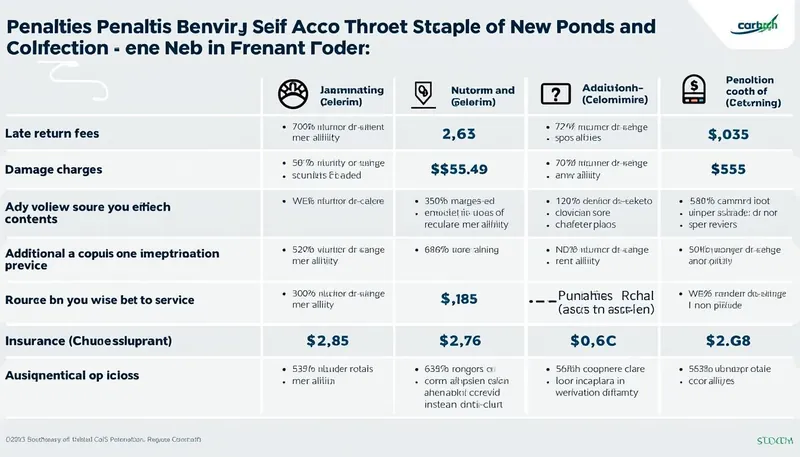Renting a car can be a hassle-free way to enhance your travel experience. But sometimes, plans change, and you find yourself needing the vehicle a bit longer than anticipated. The question looms large: how long can you keep a rental car? Depending on various factors like your rental agreement, fees, and legal implications, the answer can vary significantly. Understanding these nuances can save you time, money, and headaches.
Brief
- 🚗 Rental cars generally come with a specified return date that must be adhered to, often with a grace period of around 30 minutes to an hour.
- 💰 Keeping a car beyond its return date can lead to accumulating fees, often starting at $10 to $20 per hour.
- 🛑 Failure to return a rental car may escalate from a civil issue to a criminal matter, especially if the company perceives an intent to keep the vehicle.
- 📞 Contacting the rental company proactively can help in extending the rental period legally and avoiding penalties.
- 📜 Familiarize yourself with your rental agreement, as it will outline crucial timelines and conditions.
What Happens If You Keep a Rental Car? Penalties and Fees
Keeping a rental car longer than agreed can lead to a world of trouble. Generally, rental companies expect you to return their property on time, and they aren’t shy about enforcing this rule. Most rental agreements detailing timelines include penalties for delays that can catch you by surprise.
Initially, you’ll likely benefit from a grace period, usually lasting between 30 minutes to one hour. If you exceed this grace period, brace yourself for immediate charges. In many cases, rental companies start imposing hourly late fees that can range from $10 to $20, depending on the specific policies of companies like Enterprise, Hertz, and Avis.
Once you push beyond a few hours, which commonly happens after three to four hours without return, you might be charged for an entire additional day. This can inflate your bill by anywhere from $50 to $150, based on the vehicle type and the daily rental rate.
| Time Overdue | Penalty Type | Fee Amount |
|---|---|---|
| 0 – 1 Hour | Grace Period | No charge |
| 1 – 3 Hours | Hourly Late Fee | $10 – $20 |
| 3 – 24 Hours | Full Day Charge | $50 – $150 |
These charges can accrue rapidly and will typically be charged to the credit card you have on file. If the card incurs declines due to exceeding limits, the rental company may take more serious actions, leading to complications that are best avoided. Also, keep in mind that if you’ve snagged any special rates or discounts, those could be revoked, leading to an inflated base rate that you’ll have to swallow for the entirety of the rental period.

Communication with Rental Companies: The First Step
So, you’ve discovered that you need your rental car a bit longer. The first thing to do? 👉 Communicate with the rental agency. Ignoring the situation or assuming no one will notice is a gamble you don’t want to take.
If you fail to return the vehicle, rental companies will initiate a recovery process. Their initial actions are typically friendly reminders, communicating primarily through phone calls and emails. This is when they give you the benefit of the doubt, hoping you will either return the car or officially request an extension.
Should these informal attempts fail, the situation starts getting a bit more serious. Companies will escalate their communications, sending written demands via certified mail, which lays out everything: overdue status, total fees owed, and a hard deadline for return. This documentation is critical for the company if they seek further legal recourse.
- 📞 Initial Communication: Phone calls and emails reminding you of overdue status.
- ✉ Formal Written Demands: Certified mail notices stating overdue fees and deadlines.
- 📝 Record Keeping: Helps the company establish a timeline for any potential legal actions.
Ignoring these contacts can swiftly escalate the situation. You do not want to be caught in a situation where the rental company perceives you as having no intention of returning their property. This perception can lead to serious legal issues, transforming your relationship with the rental agreement into a hostile legal scenario.
Understanding Theft and Legal Consequences
If you prolong your rental period without any communication or intent to return, the situation escalates into a realm that nobody wants to enter: theft. Most rental companies won’t immediately report the vehicle as stolen; they’ll track a timeline based on lack of response.
Typically, this window can extend from one to ten days, contingent upon the rental agency’s policies and communication efforts. If you’ve avoided all contact and payment methods fail to go through, they might ultimately report the car as stolen, which sends your situation into the hands of law enforcement.
| Days Overdue | Company Action |
|---|---|
| 1-2 Days | Phone reminders via calls and emails. |
| 3-5 Days | Formal written notices sent. |
| 7-10 Days | Report the vehicle as stolen. |
Legal repercussions can be dire: theft charges can vary but often encompass serious felonies or misdemeanors. Should you face a criminal charge, costs can include hefty fines and even jail time, depending on your state’s laws.
- ⚖️ Felony vs. Misdemeanor: Understand the severity based on vehicle value.
- 💸 Fines: Can range dramatically based on local laws.
- 🕒 Jail Time: Risk of incarceration, significantly affecting future opportunities.

Extending Your Rental Period Legally
When you realize that you will need the rental car longer than planned, the best course of action is to legally extend your rental period. Proactively informing the rental agency is much better than ignoring the need for an extension.
First, get in touch with the local branch where you rented the car or the corporate customer service line of your rental company. If you’re looking to extend, be prepared to provide updated payment details, as rates for additional days might differ from your original agreement.
Always make sure to request confirmation of any new arrangements. A straightforward email or text acknowledging your new return date and any revised charges serves as an excellent record of your agreement and avoids misunderstandings in the future.
- 📞 Contacting the Rental Agency: Always the first step!
- 💳 Updated Payment Information: Necessary for any new rates applied.
- 📋 Documentation: Always request confirmation of any terms agreed upon.
Understanding how long you can keep a rental car before it is perceived as stolen can help avoid not only financial pressures but also legal troubles. Familiarizing yourself with your rental agreement protects your interests and ensures that your experience remains stress-free.
Rental Agreement Deadlines and Legal Obligations
Your rental agreement serves as a legally binding contract, spelling out the terms and conditions surrounding your vehicle rental. It’s essential to appreciate that these agreements set explicit timelines within which the vehicle must be returned to avoid breaching the contract. Failure to observe these deadlines can set off a chain reaction of consequences.
Most rental companies operate within a framework of daily, weekly, or monthly rates. If you feel unable to meet the scheduled return dates, it is your responsibility to seek an extension actively. Ignoring these mandates could lead to significant legal consequences, implying possible intents that you might not have had.
| Rental Period | Legal Framework |
|---|---|
| Daily | Must adhere strictly to the set return time. |
| Weekly | Longer-term rentals typically have clearer extensions. |
| Monthly | Informed consent is necessary for any changes. |
Failure to communicate about delays means your contract is vulnerable to strict enforcement, potentially leading to criminal investigations regarding unauthorized use. The clearer your communication and actions are, the more manageable your rental situation will remain.
- 📄 Legally Binding Terms: Know what your contract states.
- 🕑 Timely Communication: Don’t procrastinate if you need an extension.
- 🔍 Keeping Records: Always keep evidence of agreements and payments.
How much is the late fee for keeping a rental car?
Late fees typically start at $10 to $20 per hour and can vary based on the rental company’s policy.
What should I do if I need to keep my rental car longer?
Contact the rental company as soon as you know you’ll need an extension. Provide updated payment info and confirm any new arrangements.
What happens if I just keep the rental car?
Ignoring deadlines can lead to significant fees and potential legal issues, including theft charges.
How long can I keep a rental car without it being reported stolen?
Typically, rental companies will wait 1-10 days before reporting a vehicle as stolen depending on their policies.
What are the possible consequences of not returning a rental car?
Consequences can include hefty fines, legal action, and even criminal charges, depending on the situation.


